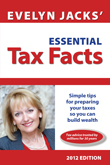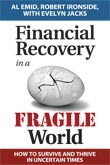Last updated: February 08 2012
Evelyn Jacks: What Should Be Taxed More ó Current or Future Income?
Governments getting their fiscal houses in order are asking taxpayers to depend less on government services and take more responsibility for the future. But those same taxpayers are wrestling with two layers of taxes: taxes on income, which erodes current income, and taxes on capital appreciation, which erodes future income.
This seems counter-productive to the concept of self-reliance.
That begs questions about our tax system. Should current income be taxed more than the future income that capital appreciation provides, as happens now? Should they be taxed equally? Or should capital appreciation ó often seen as the purview of the wealthy ó be taxed more than current income? These are very important considerations, especially in these volatile times, and there are arguments to be made on both sides.
On the side of lower taxes on current income is the time value of money. Presently, taxes leave taxpayers with fewer after-tax dollars to put into the tax-advantaged savings vehicles at their disposal: Tax-Free Savings Accounts (TFSAs), which create tax-exempt income from after-tax dollars, and tax-deferred registered accounts such as Registered Retirement Savings Plans(RRSPs) or employer-sponsored pension plans.
When governments take tax dollars off the top of taxpayers' employment income, they remove important wealth-compounding opportunities. At the outset, savings balances are lower, and the advantage of whole dollars compounding over time is lost. The most important defence a responsible taxpayer has is the ability to keep more of the first dollar he or she earns and invest it promptly in a tax-protected account. Then, he or she is in a position to create the self-reliant income required for the future. (Governments, meanwhile, still have an opportunity to tax future income.)
Unfortunately, millions of Canadians are using their after-tax dollars to fund non-discretionary needs and do not have enough "redundant incomeî to save for the future. (See "Contribute to your RRSP,î Knowledge Bureau Report, Feb. 1).
But spending decisions also factor into the equation. Families can work toward creating "savings roomî and tax efficiency will jump-start that process. For example, an RRSP creates new capital through tax savings that, in turn, can fund TFSAs, RRSPs, non-registered accounts and non-financial assets.
Those with taxable assets come up against a second erosion of wealth ó the tax on accumulated capital. Many think the asset-rich should pay more and government taxes at the time of actual sale or "deemed dispositionî (death or emigration, for example) should be higher. We want to be very careful here. If the goal is self-reliance, we donít want to rob future generations of the ability to earn income on that inherited capital ó or future governments of the ability to tax the income that will be generated by it.
Yet another factor affects capital accumulation: because the adjusted cost base of a capital asset is not indexed to inflation, any increase in inflation subjects the value of capital to a powerful and hidden tax, one that's based on inflated values rather than real values. Government coffers win in times of high inflation; investors lose on a net basis.
So, which should be taxed more ó current or future income? There is no easy answer. In the end, what matters to everyone ó individuals, families and communities ó is what we keep and how much it is worth when we need it. In this volatile economic climate, ensuring financial freedom for the future is, at best, difficult.
It's Your Money. Your Life. Do you understand how your current income and future income from accumulated assets are taxed? If you are not sure, ask your tax and financial advisors. Discuss what you can do to protect your income and capital from the eroding effects of tax and inflation and manage both better to secure your financial future.


